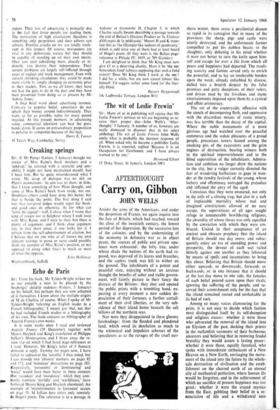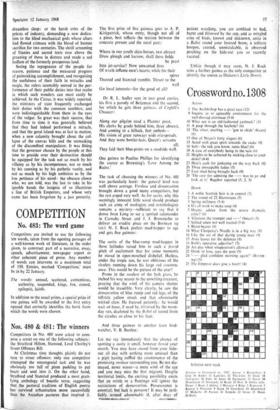Carry on, Gibbon
AFTERTHOUGHT JOIN WELLS
Amidst the arms of the Americans, and under the despotism of France, we again inquire into the fate of Britain, which had reached, toward the close of the twentieth century, the lowest period of her depression. By the successive loss of the colonies, and by the undermining of the economy in defensive war as in abject peace, the sources of public and private opu- lence were exhausted: the lofty tree, under whose shade the nations of the earth had re- posed, was deprived of its leaves and branches, and the sapless trunk was left to wither on the ground. The inhabitants of a potent and peaceful state, enjoying without an anxious thought the benefits of sober and stable govern- ment, will faintly picture in their fancy the distress of the Britons: they shut and opened the public prints with a trembling hand, ex- pecting at every moment a new sudden de- preciation of their fortunes, a further curtail- ment of their civil liberties, or the very sub- sidence of their island home beneath the salt billows of the northern seas.
Nor were they disappointed in these gloomy forebodings: from the flooded and plundered land, which owed its desolation as much to the whimsical and impulsive schemes of the speculators as to the ravages of the cruel nor- them winter, there arose a pestilential disease so rapid in its contagion that in many of the provinces the sheep, pigs and cattle were utterly destroyed, and the unfortunate farmer compelled to put his noblest beasts to the slaughter, only debating in his mind whether it were not better to turn the knife upon him- self and escape for ever a life from which all peace and happiness had departed. The result- ing scarcity and famine served only to enrich the powerful, and to lay an intolerable burden upon the weak, already enfeebled by disease, dulled into a brutish despair by the false promises and petty deceptions of their rulers, and driven mad by the frivolous and inane entertainments imposed upon them by a cynical and effete aristocracy.
The rot of the countryside, offensive with the stench of decomposing flesh, and oppressive with the discordant moans of rustic misery, was less terrible than the decay of the capital. Where the noble monuments of a more glorious age had watched over the peaceful commerce and the sedate pleasures of a proud people, precarious towers leaned among the smoking pits of the excavators and the grim engines of destruction, bearing witness both to the spiritual impoverishment and to the blind superstition of the inhabitants. Admira- tion and ambition no longer drew the nations to the city, but a vulgar curiosity directed the feet of wandering barbarians to gape in won- der at the tawdry festivals of the young, whose lechery and effeminacy outraged the prejudice and inflamed the envy of the aged.
Conscious that they were ensnared, not only in the toils of a closing trap, but also in a web of implacable mortality whose real and imagined constrictions allowed of no easy escape, the superstitious of all ages sought refuge in innumerable bewildering religions, the absurdity of whose theses was only equalled by the conviction with which they were em- braced. United in their acceptance of an ancient and obscure prophecy that the island, of Britain should one day move, and subse- quently enjoy an era of unending power and prosperity, the devout of each sect railed bitterly against one another as they laboured by means of spells and incantations to bring this about. Believing that Britain should move either upwards or downwards, forwards or backwards, or in one instance that it should at the last day move to one side, the fanatics of each belief poured scorn upon their rivals, ignoring the suffering of the people, and re- served their astonishment only for the fact that the island remained rooted and unshakable in its bed of rock.
Among so many voices clamouring for the prize, it is not easy to decide which faction most distinguished itself by its self-deception and religious excess: whether it were those who advocated the removal of the island into an Elysium of the past, decking their priests in the outlandish vestments of their barbarous ancestors and believing that in restoring feudal brutality they would assure a lasting peace: whether it were those, equally fanatical, who spoke with immoderate enthusiasm of a New Heaven on a New Earth, envisaging the move- ment of the island into the future by the whole- sale destruction of civilisation and the estab- lishment on the charred earth of an eternal city of mechanical perfection, where human ills would be forgotten, and in the achievement of which no sacrifice of present happiness was too great: whether it were the crazed mystics from the East, gabbling their belief in a re- nunciation of life and a withdrawal into
dreamless sleep: or the harsh cries of the priests of industry, demanding a new dedica- tion to the blind mechanical gods whose altars had flowed crimson with the blood of human sacrifice for two centuries. The shrill screaming of litanies and sacred texts rose above the groaning of those in distress and made a sad bedlam of the formerly prosperous land.
Seeing the repugnance of the people for reason, patience and the measured progress of painstaking accomplishment, and recognising the usefulness of their faith in miracles and magic, the rulers insensibly moved in the per- formance of their public duties into that realm in which such wonders can most easily be achieved. In the Circus, it was widely reported, the ministers of state frequently exchanged their duties with the common tumblers, and were indistinguishable from them in the eyes of the vulgar. So great was their success, that from time to time it was generally believed that they had indeed performed a miracle, and that the great island was at last in motion, when a new calamity brought about the col- lapse of the canvas hills and the unmasking of the discomfited manipulator. It was fitting that the governor chosen by the people at this time to preside over their destruction should be equipped for the task not so much by his villainy as by his incompetence, not so much by his cunning as by his pathetic vanity, and not so much by his high ambition as by the low pettiness of his mind: the obscure clown who, we are told, was the last to take in his ignoble hands the insignia of so illustrious a line of British Emperors, and whose very name has been forgotten by a just posterity.































 Previous page
Previous page